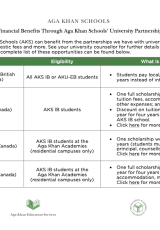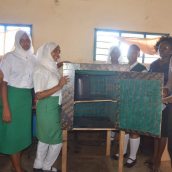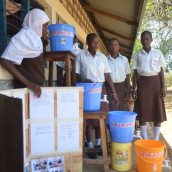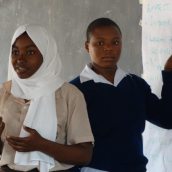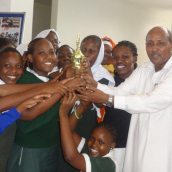Girls using science to change their communities in Kenya
Faculty at the Academies receive ongoing collaborative training. Outreach programmes that help support educators from other schools include the Professional Learning for Educators Series (PLES). The series includes programmes for teachers in various subject areas such as English language and mathematics as well as specialised programmes focusing on skills and understandings related to education. Professional competences are built by enhancing teachers’ subject knowledge and by examining how to teach that subject effectively.
Educating Girls in Science (EGIS) is one of the projects under the Aga Khan Academy Mombasa’s PDC outreach programme. It is supported by the Intel Foundation and Aga Khan Foundation USA and implemented by the Academy. EGIS endeavours to improve learning of science for all students, raise awareness of science as a life skill and increase the number of girls advancing in science studies.
Lucy Mwandawiro is a chemistry teacher at the Aga Khan Academy and the EGIS Project Coordinator. She is part of a team that brought together over 100 girls in Kwale County, Kenya to talk about how they are bringing solutions to their communities based on their experiences with science.
Using classroom science to improve quality of life
Through interviews with community members, Rechal and her peers found that many of the homes do not have toilets. When it rains, the surface water gets contaminated, and this is the same water that some people drink. Rechal and her friends found that cholera, diarrhoea and dehydration are common sicknesses in their community. According to the United Nation's Sustainable Development Goal (SDG) 6, at least 1.8 billion people globally use a source of drinking water that is fecally contaminated, and each day nearly 1,000 children die due to preventable water and sanitation-related diarrhoeal diseases.
These girls are part of the EGIS project, which has trained girls in science clubs to use classroom science to respond to issues within their communities. Its purpose is to encourage positive changes in attitude towards girls taking science subjects and to showcase science as a life skill to improve the quality of life.
Rechal, together with the science club members, have suggested the use of biosand filters as a way to clean the water, reduce gastrointestinal diseases and create awareness. They reflect in their proposal that “although this may not solve the water crisis in the Jego community, it can become part of a comprehensive public health policy to restore the fundamental right to clean water.” The water filter has gone through progressive improvement after presentation to their peers and science teachers. The hope is that eventually it will provide members of the community with a means of accessing clean drinking water.
Solving problems with biogas
EGIS girls, Lindsey Chanzera and Shufaa Salim, among 63 other science club members at Matuga Girls High School, are making strong connections between classroom learning and improving the quality of life. They came together to figure out how to deal with the smell from leftover food in their school and suggested the breakdown of organic matter in the absence of oxygen to produce biogas.
With the support of their teacher, Rajab Tsuma, their solution was an innovative mini biogas plant using locally available material. While exploring the issue, the girls realised that biogas is a good alternative to fuel and could be used in rural areas where electricity is not available. They found out that different types of animal waste have been used as biogas in other parts of Kenya. This solution is one way of addressing the large global issue. Over 1.2 billion people – one out of every five people in the world – do not have access to electricity, according to research around SDG 7. The majority are concentrated in a dozen countries in Africa and Asia. Matuga girls are now collecting and testing their product as they create a cleaner environment around their school kitchen.
Developing competencies in science
The 24 community-based projects undertaken by the girls in the EGIS programme are enabling them to acquire competencies recommended by KICD, including critical and creative thinking, problem solving, decision-making, and communicating effectively. The EGIS team continues to meet these girls and their teachers to create a forum where these competencies are demonstrated as knowledge, skills, attitude and values change.
The EGIS project is looking to use the learnings from the current two-year pilot programme to scale up to other girls’ secondary schools and include new innovations such as technology integration. The project is keen to address the issue of out-of-school adolescent girls and encourage them to go back to school, either through a tailor made academic enrichment programme or to acquire vocational training skills through an adapted version of a highly commended life skills programme developed internally by the Aga Khan Academy Hyderabad's Professional Development Centre.
By Lucy Mwandawiro, chemistry teacher and Educating Girls in Science Project Coordinator
Newsletter readers please click here to return to the newsletter (browser version)
publications
